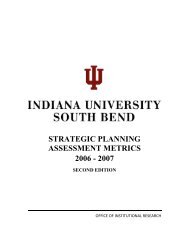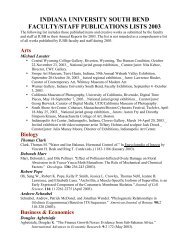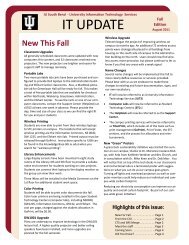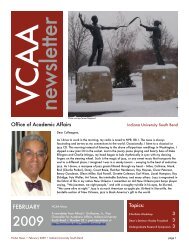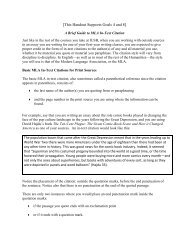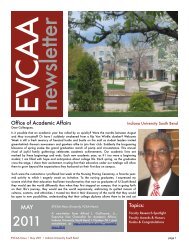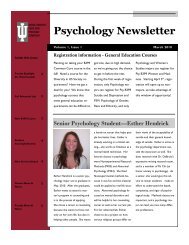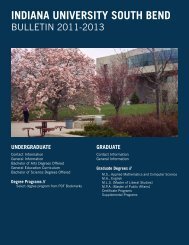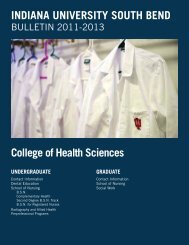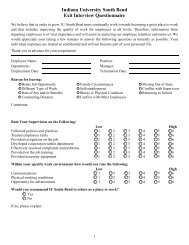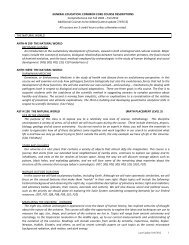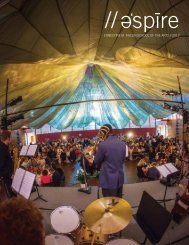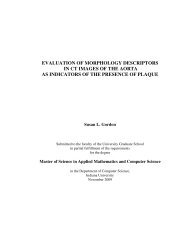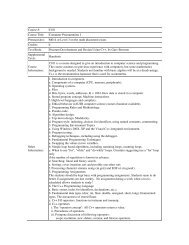Current version - Indiana University South Bend
Current version - Indiana University South Bend
Current version - Indiana University South Bend
You also want an ePaper? Increase the reach of your titles
YUMPU automatically turns print PDFs into web optimized ePapers that Google loves.
2723 IU SOUTH BEND COURSE DESCRIPTIONS<br />
ANTH-A 315<br />
ANTH-A 360<br />
ANTH-A 385<br />
ANTH-A 390<br />
ANTH-A 460<br />
ANTH-A 495<br />
ANTH-A 496<br />
qUANTITATIVE RESEARCH METHODS (3 CR.)<br />
This course will guide students through the<br />
major steps of quantitative research. These<br />
steps include choosing a topic, developing<br />
propositions, operationalizing concepts,<br />
proposing hypotheses, and collecting data.<br />
Students will be introduced to quantitative<br />
data analysis and will learn how to<br />
interpret the results from such analyses.<br />
development of anthropological<br />
thought (3 cr.)<br />
An overview of the major theoretical<br />
developments within anthropology, as<br />
the discipline has attempted to produce<br />
a universal and unified view of human<br />
life, based on knowledge of evolution and<br />
prehistoric and contemporary cultures.<br />
topics in anthropology (1-3 cr.)<br />
A conceptual examination of selected<br />
topics in the field of anthropology. May<br />
not be repeated for more than 6 credit<br />
hours. Students may receive credit for<br />
only 3 credit hours each of ANTH-A 385<br />
and ANTH-A 460.<br />
ART, AESTHETICS, AND CREATIVITY (3 CR.)<br />
Explores, in an interdisciplinary way,<br />
culture, cultural artifacts, and the role of<br />
art in the formation and expression of a<br />
particular culture. A historical perspective<br />
on the intellectual tradition reveals both<br />
change and deeper continuities in the<br />
social and spiritual values underlying the<br />
making of art. Issues of practice of the<br />
craft receive greater emphasis at this level.<br />
Meets general education common core Art,<br />
Aesthetics, and Creativity requirements.<br />
Topics in Anthropology (1-3 cr.)<br />
A conceptual examination of selected<br />
topics in the field of anthropology. May not<br />
be repeated for more than 6 credit hours.<br />
Individual readings in Anthropology<br />
(1-4 cr.)<br />
P: Consent of instructor. A supervised,<br />
in-depth examination, through individual<br />
research on a particular topic selected and<br />
conducted by the student, in consultation<br />
with an anthropology faculty member.<br />
Field study in anthropology (1-8 cr.)<br />
P: Consent of instructor. Supervised<br />
fieldwork of an anthropological nature,<br />
arranged through an outside agency<br />
or institution, such as an internship,<br />
apprenticeship, or volunteer work<br />
at a governmental office, zoo, or<br />
archaeological site. May not be repeated<br />
for more than 6 credit hours.<br />
ANTH-B 190<br />
ANTH-B 300<br />
ANTH-B 320<br />
ANTH-B 399<br />
ANTH-B 466<br />
ANTH-E 105<br />
HUMAN BEHAVIOR AND SOCIAL<br />
INSTITUTIONS (3 CR.)<br />
Develops insights into human nature,<br />
the nature of social institutions, the<br />
social processes that shaped the world<br />
of the twenty-first century. In an<br />
interdisciplinary way, introduces the<br />
distinctive perspectives of the social<br />
sciences, emphasizing frameworks and<br />
techniques used in explaining causes and<br />
patterns of individual and institutional<br />
behavior.<br />
FUNDAMENTALS OF BIOANTHROPOLOGY<br />
(3 CR.)<br />
Bioanthropology of humans, basic<br />
biological principles, morphology,<br />
function of evolutionary history.<br />
Human evolution from lower forms,<br />
environmental factors, speciation and<br />
differentiation into varieties, mixture,<br />
growth, sexual differences, and<br />
constitutional variability.<br />
FORENSIC ANTHROPOLOGY (3 CR.)<br />
This course will explore the application<br />
of biological anthropology in the legal<br />
process of death investigation. Topics<br />
to be covered include: determining<br />
sex, age, and ancestry from human<br />
remains; procedures for reconstructing<br />
trauma and/or pathological conditions<br />
from skeletons; the ethics of forensic<br />
anthropology; and working with law<br />
enforcement agencies.<br />
HUMAN BEHAVIOR AND SOCIAL<br />
INSTITUTIONS (3 CR.)<br />
Develops insights into human nature,<br />
social institutions, and social processes<br />
that have shaped the world of the<br />
twenty-first century. Explores a specific<br />
critical problem or social science theme<br />
in a manner that takes into account<br />
perspectives from several disciplines.<br />
Attention given to ethical dilemmas as<br />
they arise in the discipline and theme of<br />
course.<br />
The primates (3 cr.)<br />
The study of our closest living relatives,<br />
the prosimians, monkeys, and apes from<br />
the perspective of evolutionary and<br />
environmental influences on morphology<br />
and complex social behavior.<br />
Culture and Society (3 cr.)<br />
Introduction to the comparative study of<br />
contemporary human cultures and their<br />
relation to social processes and behavior.<br />
I, II, S<br />
P = Prerequisite, R = Recommended, C = Concomitant, VT = Variable Title<br />
I = fall semester, II = spring semester, S = summer session(s)



